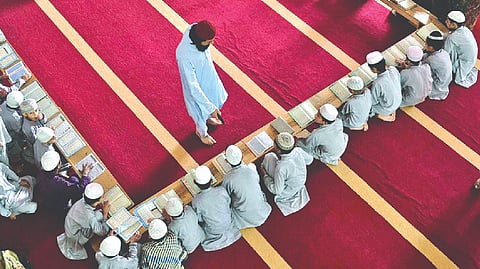

ISLAMABAD: Atta Muhammad, 38, runs a small grocery store on the outskirts of Pakistan’s capital Islamabad. Like many of his friends and relatives, he sends his children to a local madrasa after school to get Quran lessons. Madrasas are boys-only Islamic religious schools for elementary and higher learning. They are mostly run on the premises of mosques.
In the South Asian nation, all madrasas need a government license to operate, but, in practice, many operate without it. The madrasa that Muhammad’s children attend also lacks a license, but he says he doesn’t care. “I’ve just learned from you that the madrasa is illegal, but even if it doesn’t have a license to operate, it doesn’t matter to me,” he told DW.
“What matters is that it’s doing a great service to our religion [Islam] by teaching our children how to read and understand the Quran and that, too, free of charge,” he said.
Many Pakistanis hold a similar view, making it difficult for authorities to shut down madrasas that are operating illegally. According to a list compiled by Islamabad police, the capital alone has 562 madrasas but many of them — nearly 250 — are not registered, as required by the government for their establishment and operation.
Authorities say they refrain from taking action on the illegally operating ones for fear of provoking a hostile response from Islamic hardliners in the nation’s religiously conservative society. Pakistani Muslims are generally very sensitive about their religion and they consider any reforms to Islamic laws or institutions an attack on the religious character of society, a senior police official, who asked not to be named due to the sensitivity of the matter, told DW. He cited the killings of Punjab province’s former governor, Salman Taseer, and an ex-federal minister, Shahbaz Bhatti, for demanding amendments to the nation’s notorious and much-misused blasphemy law.
Even the former military dictator General Pervez Musharraf received death threats over the 2007 military offensive against the country’s Lal Masjid (Red Mosque) and an adjacent madrasa for their advocacy of radical Islam. Most of the students in madrasas hail from impoverished families. For them, these seminaries are important institutions and often the only way for their children to get an education.
The madrasas also provide the children with food, clothing and shelter. A handful of them also offer formal education. Shafqat Munir Ahmed, an analyst at the Sustainable Development Policy Institute (SDPI), said that most students at the capital’s madrasas are from remote and poverty-stricken districts of Khyber Pakhtunkhwa and Punjab provinces.
He noted that their families were too poor to feed them, and the seminaries offered them free food, clothing, lodging and a “secure” future.
Ahmed added that some lower middle-class families also send their children to madrasas to learn Islamic teachings. It’s not just madrasas that skirt the law, however, many mosques in the capital are also constructed and operated illegally.
Islamabad’s municipal authorities carried out a survey in 2017 and found that of the city’s 492 mosques, almost half (233) were being operated illegally on publicly owned land. Many legally operated mosques also encroached upon public land to put up prayer halls, rooms, toilets, kitchens and shops, etc., the survey showed. A city official told DW that they had not conducted any such surveys over the following years. He pointed out that authorities were unable to act on the illegal encroachments due to strong opposition from clerics.
Visit news.dtnext.in to explore our interactive epaper!
Download the DT Next app for more exciting features!
Click here for iOS
Click here for Android